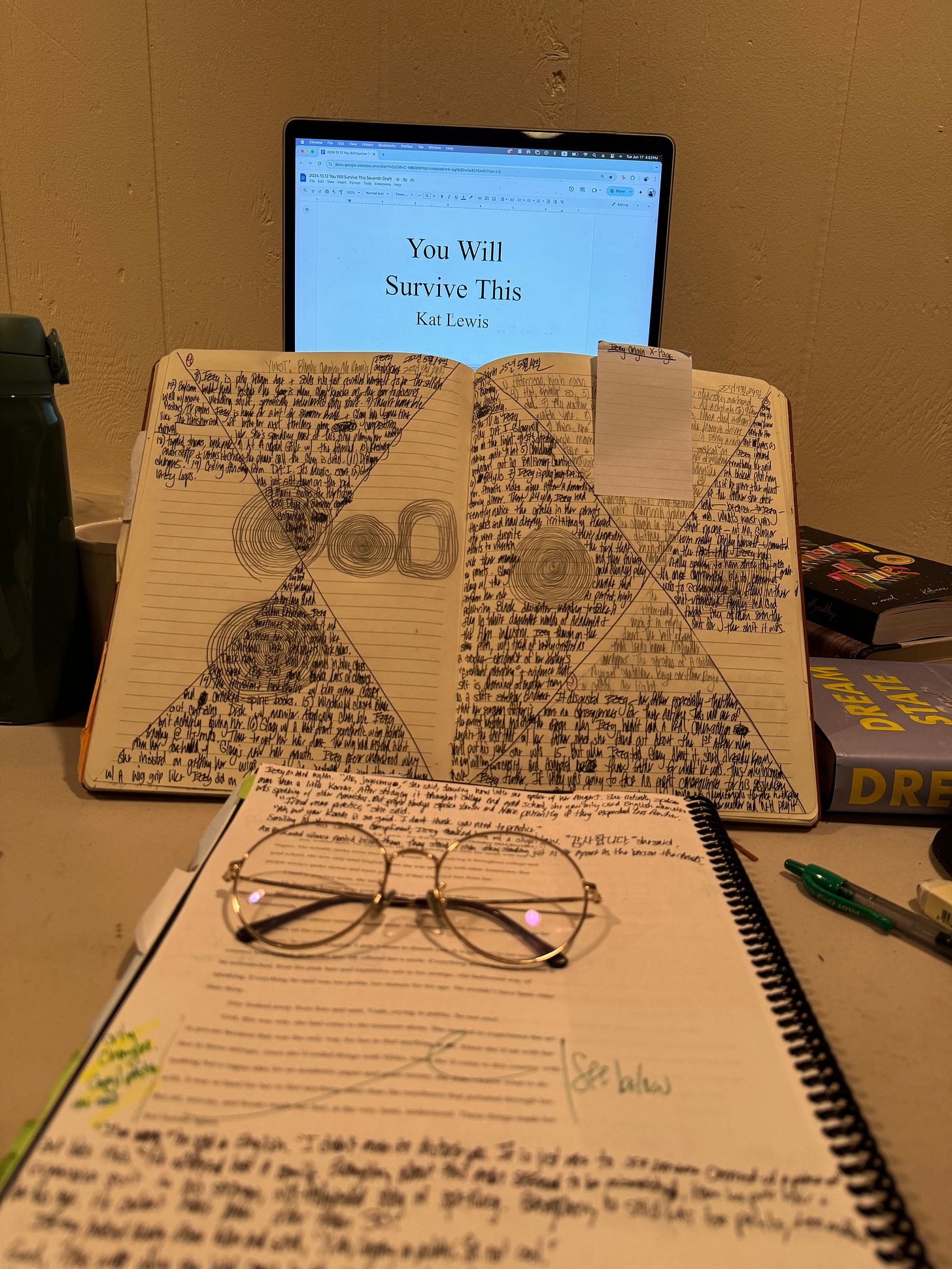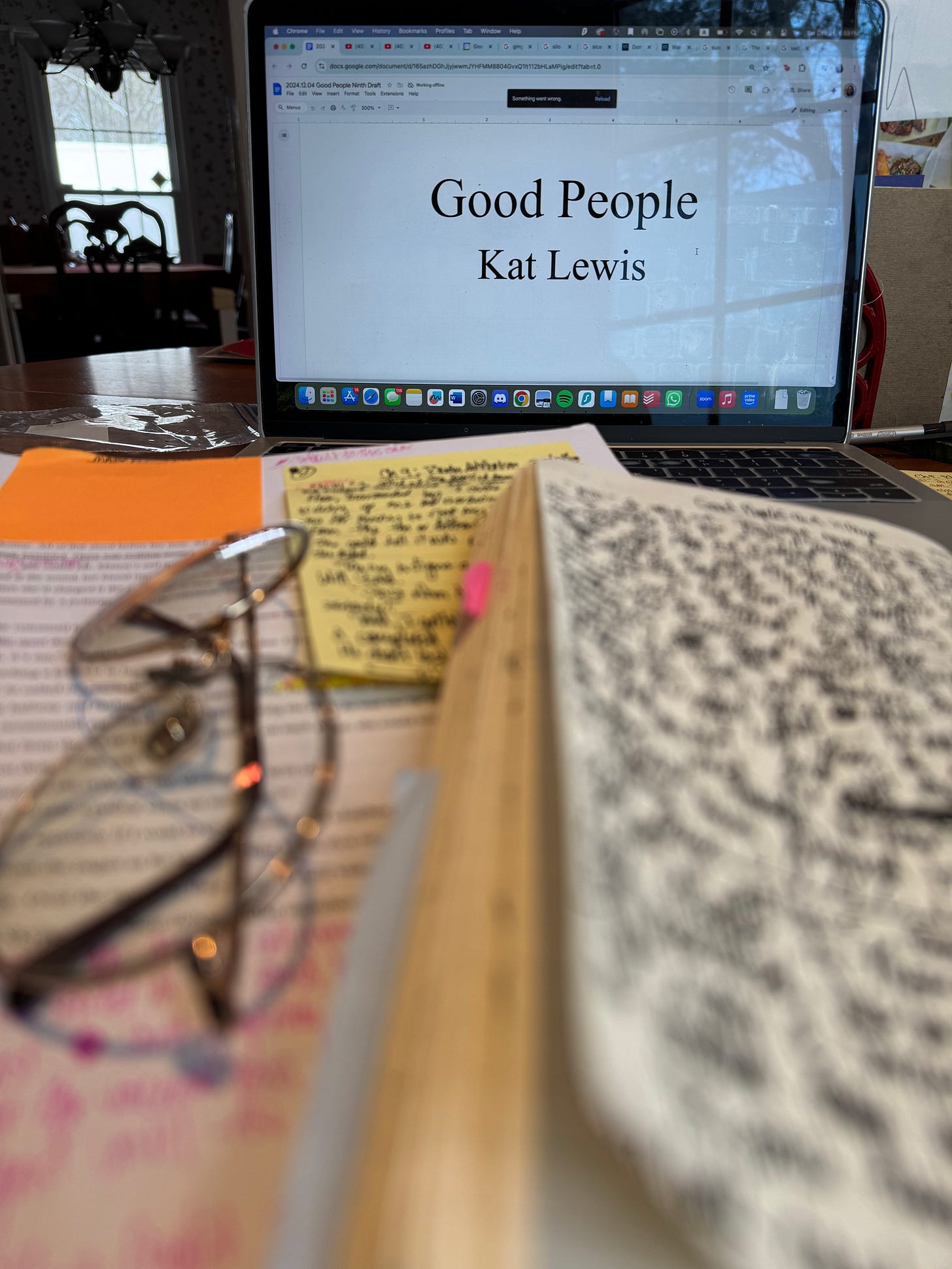Before I sold my debut novel, Good People, to Simon & Schuster, I had quit writing for a year. I made the decision to step away from my writing desk after two of my books died on submission to publishers. Honestly, I didn’t want to give up, especially after dedicating so much time—ten years, two creative writing degrees, and a Fulbright Creative Arts Grant—to breaking into the publishing industry, but my self-doubt had reached such a soul-crushing level that it physically pained me to write. And so, when I received the revise and resubmit request that would eventually sell my first book, returning to my writing desk felt like an insurmountable task. Every time I sat down to write, I second guessed every decision I made from word choice and syntax to scene craft and story structure. After each writing session, I’d spend the rest of the day fretting over whether or not my pacing was effective or my jokes were landing or my tension was taut and story compelling.
Needless to say, all of this self-doubt was making my writing life unsustainable, and I thought I was going to quit again until I read Alan Watt’s craft book, The 90-day Novel1. At the beginning of the book, Watt states that characters do not have problems; they have unsolvable dilemmas. Since the dilemmas cannot be resolved, the character must transform through a shift in their perception in order to survive the story.
For me as a writer, my dilemma is that the novel I’m working on may never see the light of day. When my books died on sub, I had completely succumbed to this problem. But Watt’s book helped me realize that my goal of traditionally publishing any given book is almost entirely out of my control. This goal is an unsolvable dilemma because short of writing and revising the book, I have very little sway over which editors acquire my books (or if any of them even want to acquire my books at all!). Once I realized that my publishing goals were an unsolvable dilemma, I understood that a shift in perception could save my writing life.
Nearly a decade ago, I had started writing Good People and You Will Survive This with one goal in mind: publish a novel to qualify for tenure-track jobs in the US. For eight long years, this goal drove every decision I made in both my professional and personal life. When Good People originally died on sub in 2022 and YWST a year later in 2023, I was devastated. My life as a writer was over, my dreams of becoming a college professor shattered.
In order to finish the revise and resubmit request, I had to reframe my perception and relearn how to write for the sake of writing just like I did when I was a kid. In reframing my perception of my writing life, I would always succeed at what I set out to do—write a novel—even if I failed at my career-related writing goals. This shift in perception was a necessary transformation for my writing life to survive. Now, it’s easy to say, “Change your outlook, and your self-doubt will go away,” but what does that look like in practice? For me, it all comes down to the writing wind down routine I do at the end of each session.
When I was an MFA student at the University of South Florida, my pedagogy professor, Dr. Heather Sellers, taught our class a great way to do midterm course evaluations. She had us give our students an anonymous survey in which they write the following:
Three things that are going well in the course
Two concerns about the course
One question about the course
For writing, I’ve modified these prompts to a process-focused exercise I do at the end of every writing session. Here’s the template I use:
Three things that are working well in the draft
Two concerns I have about the draft
One question I will answer in my next writing session
As a rule, I always keep my answers concrete and craft-focused. “I’m worried that my character’s goals are too abstract” is a concrete, solvable concern whereas “I’m worried that I’m not a ‘good’ writer” is not. Along with that, I also make myself answer each bullet point in a single sentence. This constraint prevents the exercise from eating into my writing time.
Overall, this wind down routine does two important things to help me combat my self-doubt. First, by acknowledging my strengths and concerns, I’m able to leave my anxieties at my writing desk. This way I’m not constantly worrying about my book when I’m watching TV or hanging out with my friends. This exercise also encourages me to be curious about the writing process. If I’m curious about the process, I’m more invested in the writing itself rather than the final product. Thanks to this routine, I’m generally less anxious about how Good People will do when it comes out next year or the possibility of my current WIP failing to sell, and (most importantly!) I’ve found a lot more joy when I sit down to write.
Last week, I wrote about how I’m reviving You Will Survive This with a page-one rewrite, and this wind down routine has helped me turn my self-doubt into a clear path for revision. Before I share my latest wind down routine as an example, here’s YWST’s pitch for context:
You Will Survive This follows the story of three people in a race to kill an immortal man.
Izzy, a Black researcher in Seoul, spends her days studying Korean folklore and isolating herself from the world around her. While touring an art museum, she meets Kim Taejong, a strange, wildly wealthy man who takes a special interest in her work. Taejong flies Izzy out to Jeju Island for a research trip, and they stumble across a woman from his past. In an act of violence, Blanche—a survivor of Taejong’s former cult—reveals his secret: he’s spent the last thousand years cursed with immortality. Back in Seoul, Izzy agrees to help Taejong find a cure for immortality using her folklore research. But when she finds something that might actually work, she must choose between spending her life with the man she loves and giving his long life a well-deserved end. Alternating between the perspectives of Izzy, Taejong, and Blanche, the story complicates as Taejong wants to find peace in a permanent death immediately, Izzy wants him to stay alive for the remainder of her lifetime, and Blanche wants to kill Taejong to take his eternal life for herself.

Here’s my latest Wind Down Routine for this project:
Three Things Working Well
The new opening paragraph builds intrigue and sets up the main plot of the book effectively.
The new titles I’m considering are strong and thematically appropriate.
The theme of monstrosity is effectively set up in the new opening chapter.
Two Concerns
I’m concerned that the scene craft of the first two pages isn’t working.
I’m concerned about finding my way into the page one revision of Izzy’s character arc.
One Question to Answer:
How can I organically prompt a flashback about the death of Izzy’s sister in chapter two?
How do you manage self-doubt in your writing life? Where are you in your own writing process? What are three things that are going well? What are two concerns you have? What’s one question you’ll answer in your next writing session?
Share your wind down routines in the comments:
Until next time,
Kat
This post includes affiliate links. I may receive a commission if you make a purchase through these links. Purchasing books through the Craft with Kat Bookshop supports the free writing resources I share here on Substack.





Ooh this sounds like such a useful exercise thank you! I'm going to start revising my first three chapters (again) soon (had lots of health stuff get in the way) and I think I'll use this after I start on that revision process.
I try to end at the beginning of a new scene so it's not like I'm starting with a blank page next time.